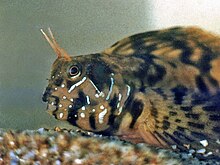The sphinx blenny (Aidablennius sphynx) is a species of combtooth blenny, and the only species in the genus Aidablennius.[3] It was described by Achille Valenciennes in 1836, originally under the genus Blennius,[4] and was later reassigned under "Aidablennius" by Gilbert Percy Whitley in 1947. It is a subtropical blenny known from Morocco, in the eastern Atlantic Ocean, and also from the Mediterranean and Black Seas.[5] Sphinx blennies inhabit shallow, rocky waters in the littoral zone, with sunlight exposure. They feed primarily on benthic algae, weeds and invertebrates.[6] Sphinx blennies can measure up to 8 centimetres (3.1 in) long in total length.[5]
| Sphinx blenny | |
|---|---|

| |
| Male | |
| Scientific classification | |
| Domain: | Eukaryota |
| Kingdom: | Animalia |
| Phylum: | Chordata |
| Class: | Actinopterygii |
| Order: | Blenniiformes |
| Family: | Blenniidae |
| Subfamily: | Salarinae |
| Genus: | Aidablennius Whitley, 1947 |
| Species: | A. sphynx
|
| Binomial name | |
| Aidablennius sphynx (Valenciennes, 1836)
| |
| Synonyms[2] | |
| |
Reproduction
editIn mating, the blennies form distinct pairs, and the females lay up to 7000 eggs in a sitting, which are then guarded in burrows by the males.[7] Males are known to cannibalize dead eggs to prevent infection spread amongst the healthy eggs, although in smaller broods they have also been reported consuming living eggs. It is believed that this is due to limited feeding opportunities for the males during breeding, as a result of their restriction to the nests.[8] FishBase considers the blennies to be of Low Vulnerability, with a reproductive doubling time of less than 15 months.[5]
References
edit- ^ Williams, J.; Craig, M.T. (2014). "Aidablennius sphynx". IUCN Red List of Threatened Species. 2014: e.T185168A1775545. doi:10.2305/IUCN.UK.2014-3.RLTS.T185168A1775545.en. Retrieved 20 November 2021.
- ^ Synonyms of Aidablennius sphynx at www.fishbase.org.
- ^ Species in the genus Aidablennius at www.fishbase.org.
- ^ Cuvier, G. and A. Valenciennes, 1836 (July) [ref. 1005] Histoire naturelle des poissons. Tome onzième. Livre treizième. De la famille des Mugiloïdes. Livre quatorzième. De la famille des Gobioïdes. Histoire naturelle des poissons v. 11: i-xx + 1-506 + 2 pp., Pls. 307-343.
- ^ a b c Aidablennius sphynx at www.fishbase.org.
- ^ Food items for Aidablennius sphynx at www.fishbase.org.
- ^ Reproduction of Aidablennius sphynx at www.fishbase.org.
- ^ Kraak, Sarah B. M. (1996). "Female preference and filial cannibalism in Aidablennius sphynx (Teleostei, Blenniidae); a combined field and laboratory study". Behavioural Processes. 36 (1): 85–97. doi:10.1016/0376-6357(95)00019-4. PMID 24896420. S2CID 8149384.
External links
edit- Aidablennius sphynx at www.fishwise.co.za
- Photos of Sphinx blenny on Sealife Collection
